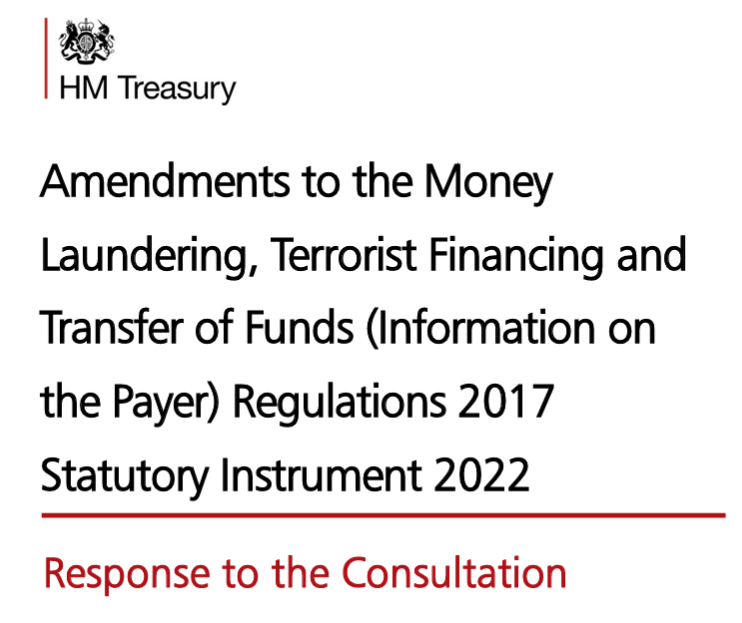Blog
UK Travel Rule Consultation Supports Crypto, Highlights Market Concerns
August 02, 2022
Regulatory stances on cryptocurrencies and blockchains are still in their nascency and we have yet to see global consensus on how exactly to treat these innovative and disruptive technologies as they continue to be explored as solutions in all sorts of industries. Like the decentralized systems themselves, there isn’t one set of guidelines that can be written to cover all aspects of crypto and blockchain regulation, but instead different instances of its implementation need to be viewed in their own light and have regulations tailored to the intricacies of the technology and the needs of the industry in question by governing bodies or legal entities.

This process can be seen happening in many countries across the world where various approaches to crypto and blockchain regulation are being discussed and trialed, and one example of this can be seen in the UK, particularly in its recent decisions over the Travel Rule for unhosted wallets.
Unhosted wallets are places where people store their cryptocurrency under their own control - without any service such as an exchange or other entity having oversight of the funds (and given the recent events surrounding Celsius, wanting to have control over your own crypto is more than understandable). It is essentially the crypto version of keeping your cash in a safe. The crypto Travel Rule on the other hand, is a measure implemented by the Financial Action Task Force that specifies certain measures for intermediaries such as cryptoasset exchange providers or custodian wallet providers. Whilst there is some flexibility in its implementation, it requires virtual asset service providers (VASPs) to share certain information (such as the amount involved, the businesses’ data, or customers’ personal data) when they transact more than a given amount in crypto. Given that the specifics of this varies from jurisdiction to jurisdiction, it can cause a nightmare for businesses trying to navigate it.
HM Treasury in the UK released a publication in June which outlines a number of consultation responses which have been taken into account in forming the UK’s approach to the travel rule. Parts of the document ‘Amendments to the Money Laundering, Terrorist Financing and Transfer of Funds (Information on the Payer) Regulations 2017 Statutory Instrument 2022’ (found here) covers a number of thoughts on regulations and cryptoassets.
The first aspect discussed tweaking Funds Transfer Regulations to fit the crypto sector, finding most respondents thought that with minor adjustments in sections such as terminology it was a good fit. The document then covered the potential costs to businesses, with the most recognising the short-term costs in finding and implementing compliance solutions, increasing in the long term as compliance requirements rise, although the benefits of cryptoassets being better regulated and therefore better received. Concerns about the amount of information required were raised, as were potential issues around personal details and public, transparent blockchains; however, the potential of Zero Knowledge Proofs to provide proof of customer due diligence checks without revealing sensitive information.
One question that drew a mixed response was the suggestion that the regulated businesses collect but not verify information from unhosted wallets. Whilst some were in favor of this it would seem rather pointless to simply have the information if nothing is going to be done with it. In light of the feedback, the government altered its proposed rules to require data collection only from transactions where there is determined to be a higher level of risk (thus requiring KYC/AML checks), but not necessitating that unhosted wallets automatically be viewed as such.
Broadly speaking, the UK has taken a middle-ground approach to the Travel Rule, implementing measures to prevent fraud and other illicit activities from benefiting from cryptoasset usage in areas deemed most at-risk, but stopping short of the levels of regulatory oversight that other countries such as the USA have chosen, and taking a lighter approach than the FATF has adopted in regards to data collection for unhosted wallets. This stance helps cements the UK’s goal of positioning itself as a crypto-hub (a position backed up by recent news of the Royal Mint creating an NFT) where there is a certain level of freedom for innovators and users of crypto and blockchain technology whilst still protecting users and businesses from fraud, encouraging the greater adoption and therefore development of the technology.
Regardless on how this approach plays out in the long run, the concerns of cost and data privacy brought up in the consultation are always going to be relevant, and increasingly more so as crypto and blockchain grow and become more commonplace across industries (a trend which is continuing and which these regulatory measures help to bring about). Naturally Blockpass is already ideally positioned to provide effective, fast and very low cost identity verification with its re-usable KYC model and over a million verified users making it an ideal implementation option for businesses wanting to achieve immediate compliance, providing a simple answer to the concerns over cost raised in the consultation. Likewise, the potential issues around data privacy that were brought up already have a solution through Blockpass’ On-Chain KYC TM, a fast and fully comprehensive KYC & AML screening software-as-a-service for blockchains which utilizes the concept of Zero Knowledge Proofs to prove a user has been verified without exposing any of their personal data to the blockchain.
The Blockpass platform is fully automated and hosted in the cloud, with no integration or setup fee. Businesses can sign up to the KYC Connect console in a matter of minutes, test out the service, and start conducting identity documents verification, KYC and AML checks. Sign up for FREE at console.blockpass.org.
By Matthew Warner